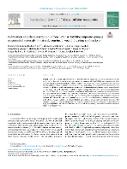Fabrication and characterization of new levan@CBD biocomposite sponges as potential materials in natural, non-toxic wound dressing applications

Author
Chełminiak-Dudkiewicz, Dorota
Długaszewska, Jolanta
Wujak, Magdalena
Smolarkiewicz-Wyczachowski, Aleksander
Bocian, Szymon
Mylkie, Kinga
Gośliński, T.
Marszałł, Michał P.
Ziegler-Borowska, Marta
Publication date
2023Published in
International Journal of Biological MacromoleculesVolume / Issue
253 (December)ISBN / ISSN
ISSN: 0141-8130Metadata
Show full item recordCollections
This publication has a published version with DOI 10.1016/j.ijbiomac.2023.126933
Abstract
Wound healing is a complex process; therefore, new dressings are frequently required to facilitate it. In this study, porous bacterial levan-based sponges containing cannabis oil (Lev@CBDs) were prepared and fully characterized. The sponges exhibited a suitable swelling ratio, proper water vapor transmission rate, sufficient thermal stability, desired mechanical properties, and good antioxidant and anti-inflammatory properties. The obtained Lev@CBD materials were evaluated in terms of their interaction with proteins, human serum albumin and fibrinogen, of which fibrinogen revealed the highest binding effect. Moreover, the obtained biomaterials exhibited antibacterial activity against Staphylococcus aureus and Pseudomonas aeruginosa, as well as being nonhemolytic material as indicated by hemolysis tests. Furthermore, the sponges were non-toxic and compatible with L929 mouse fibroblasts and HDF cells. Most significantly, the levan sponge with the highest content of cannabis oil, in comparison to others, retained its non-hemolytic, anti-inflammatory, and antimicrobial properties after prolonged storage in a climate chamber at a constant temperature and relative humidity. The designed sponges have conclusively proven their beneficial physicochemical properties and, at the preliminary stage, biocompatibility as well, and therefore can be considered a promising material for wound dressings in future in vivo applications.
Keywords
Levan, cannabis oil, Antibacterial activity, In vitro biocompatibility test, Wound dressing
Permanent link
https://hdl.handle.net/20.500.14178/2136License
Full text of this result is licensed under: Creative Commons Uveďte původ 4.0 International







